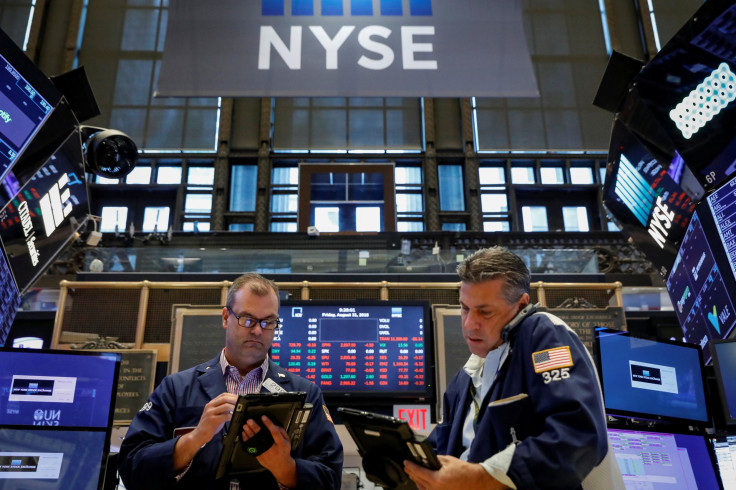Tuesday's Stock Market Close: US Equities Rise Moderately On Strong Housing, Manufacturing Data

KEY POINTS
- The Dow Jones Industrial Average rose 28.89 points
- The U.S. House of Representatives approved a $1.4 trillion spending package
- Housing and manufacturing data in U.S. came in stronger than expected
U.S. stocks rose modestly on Tuesday as some unexpectedly strong housing and manufacturing data in the U.S. was offset by worries the U.K. may leave the Europe Union without securing a trade deal with the European Union.
The Dow Jones Industrial Average rose 28.89 points to 28,264.78 while the S&P 500 added 0.84 of a point to 3,192.29 and the Nasdaq Composite Index rose 9.13 points to 8,823.36.
Volume on the New York Stock Exchange totaled 3 billion shares with 1,798 issues advancing, 178 setting new highs, and 1,164 declining, with 13 setting new lows.
Active movers were led by Tallgrass Energy LP (TGE), Proteostasis Therapeutics Inc. (PTI) and Advanced Micro Devices (AMD).
The U.S. House of Representatives approved a spending package totaling $1.4 trillion Tuesday, covering the remainder of the government’s fiscal year and averting a government shutdown.
Traders likely remained cautious in the absence of further concrete developments related to the China trade deal.
“U.S. stocks could start feeling trade optimism fatigue as we near the holidays,” wrote Edward Moya, senior market analyst at Oanda. “Expectations are now for the U.S. and China to finalize the phase-one deal in the first week of January. As lawyers review the text, it seems this deadline could get pushed even further as not all the terms have been agreed upon. President Trump wants talks to begin for the phase two deal, but that does not seem on anyone’s radar.”
Housing starts climbed 3.2% to a seasonally adjusted annual rate of 1.365 million units in November, the Commerce Department said on Tuesday. Economists had expected housing starts to rise to 1.345 million units in November.
Housing starts surged 13.6% on a year-over-year basis in November.
Homebuilding permits rose 1.4% to a rate of 1.482 million units in November, the highest such level since May 2007, due to low mortgage rates.
“Housing is an economic bellwether and its recent strength is further encouraged by the strength we’ve seen in manufacturing, as those two industries are typically related,” said Mike Loewengart, vice president of investment strategy at E-Trade Financial. “But critical to the health of housing is ongoing trade tensions.”
The Federal Reserve said manufacturing production rose 1.1% in November following downwardly revised 0.7% drop in October. Also, industrial output gained 1.1% in November after a downwardly revised slip of 0.9% in October.
Economists had expected overall manufacturing output would increase by only 0.7% and industrial output would edge up 0.8% in November.
Meanwhile, capacity utilization rose by 0.7% to 77.3% in November up from a downwardly revised 76.6% in October.
The newly elected government of Boris Johnson said it will not extend the Brexit transition period beyond the end of 2020, raising fears the U.K. could leave the European Union without having secured a trade deal with the bloc.
Andy Scott, associate director at financial risk adviser at JCRA, an independent risk adviser, said: "By outlawing an extension, it leaves very little time in which to agree a comprehensive free trade agreement with the EU and means the clock is now ticking down to a firm cliff edge next December.”
Scott added: “Markets are reminded that Boris Johnson's promise to leave the EU is something he intends to fulfill, possibly without negotiating an amicable future relationship."
Overnight in Asia, markets finished mixed. The Hang Seng gained 1.22% while Japan’s Nikkei-225 rose 0.47% and China’s Shanghai Composite jumped 1.27%.
European markets finished mixed with the FTSE 100 edged up 0.08% while Germany's DAX fell 0.89% and France's CAC 40 slipped 0.39%.
Crude oil futures gained 1.13% to $60.89 per barrel and Brent crude was up 0.05% at $66.15. Gold futures slipped 0.04%.
The euro gained 0.01% at $1.146 while the pound sterling dropped 1.54% at $1.3129.
The yield on the 10-year Treasury slipped 0.16% to 1.889% while yield on the 30-year Treasury gained 0.26% to 2.316%.
© Copyright IBTimes 2025. All rights reserved.





















